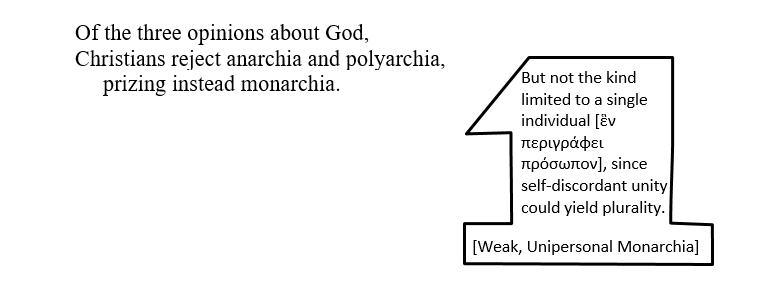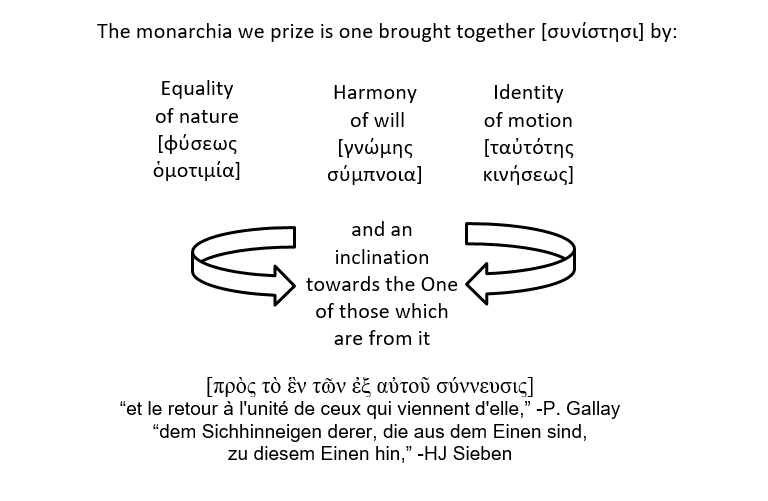A scene from The Canterbury Psalter (12th century)
Blog
Nazianzus on Trinitarian Monotheism (Orat. 29.2)
There’s a crucial text from Gregory of Nazianzus on the unity of the Trinity, found early in his third theological oration (Oration 29, section 2). Coming to terms with this passage is probably worth something like a one-unit course in seminary.
Here are the two most common English translations:
Monotheism, with its single governing principle, is what we value – not monotheism defined as the sovereignty of a single person (after all, self-discordant unity can become a plurality) but the single rule produced by equality of nature, harmony of will, identity of action, and the convergence towards their source of what springs from unity – none of which is possible in the case of created nature. The result is that though there is numerical distinction, there is no division in the substance. For this reason, a one eternally changes to a two and stops at three – meaning the Father, the Son, and the Holy Spirit. In a serene, non-temporal, incorporeal way, the Father is parent of the ‘offspring’ and originator of the ’emanation’ –or whatever name one can apply when one has entirely extrapolated from things visible.” [Lionel Wickham’s translation, in On God and Christ: The Five Theological Orations and Two Letters to Cledonius (NY: St. Vladimir’s Seminary Press, 2002), 70.]
But monarchy is that which we hold in honor. It is, however, a monarchy that is not limited to one person, for it is possible for unity if at variance with itself to come into a condition of plurality; but one that is made of an equality of nature, and a union of mind, and an identity of motion, and a convergence of its elements to unity—a thing which is impossible to the created nature—so that though numerically distinct there is no severance of essence. Therefore unity, having from all eternity arrived by motion at duality, found its rest in trinity. This is what we mean by Father and Son and Holy Ghost. The Father is the begetter and the emitter; without passion, of course, and without reference to time, and not in a corporeal manner. The Son is the begotten, and the Holy Ghost the emission; for I know not how this could be expressed in terms altogether excluding visible things. [Charles Gordon Browne and James Edward Swallow’s translation, NPNF, widely available online.]
And here’s the original Greek:
ἡμῖν δὲ μοναρχία τὸ τιμώμενον· μοναρχία δέ, οὐχ ἢν ἓν περιγράφει πρόσωπον· ἔστι γὰρ καὶ τὸ ἓν στασιάζον πρὸς ἑαυτὸ πολλὰ καθίστασθαι· ἀλλ’ ἢν φύσεως ὁμοτιμία συνίστησι, καὶ γνώμης σύμπνοια, καὶ ταὐτότης κινήσεως, καὶ πρὸς τὸ ἓν τῶν ἐξ αὐτοῦ σύννευσις, ὅπερ ἀμήχανον ἐπὶ τῆς γενητῆς φύσεως, ὥστε κἂν ἀριθμῷ διαφέρῃ, τῇ γε οὐσίᾳ μὴ τέμνεσθαι. διὰ τοῦτο μονὰς ἀπ’ ἀρχῆς, εἰς δυάδα κινηθεῖσα, μέχρι τριάδος ἔστη. καὶ τοῦτό ἐστιν ἡμῖν ὁ πατήρ, καὶ ὁ υἱός, καὶ τὸ ἅγιον πνεῦμα· ὁ μὲν γεννήτωρ καὶ προβολεύς, λέγω δὲ ἀπαθῶς, καὶ ἀχρόνως, καὶ ἀσωμάτως· τῶν δέ, τὸ μὲν γέννημα, τὸ δὲ πρόβλημα, ἢ οὐκ οἱδ’ ὅπως ἄν τις ταῦτα καλέσειεν, ἀφελὼν πάντῃ τῶν ὁρωμένων. [via Perseus, here.]
My attempt to chart the really complex early section:


I think this whole section –its contrast of merely unipersonal monarchia with a more concrete and textured monarchia, its piling up of terms for oneness, setting up the dynamics of fromness and towardness– is best taken at a single gulp.
Once you have it fixed in mind (good luck), you can built on to it: “none of which is possible in the case of created nature,” which warns us that reasoning by analogy will be of limited use in understanding this kind of unity. And then a kind of summary of the result: “though there is numerical distinction, there is no division in the substance” [ὥστε κἂν ἀριθμῷ διαφέρῃ, τῇ γε οὐσίᾳ μὴ τέμνεσθαι].
The next several moves are also important and influential. Gregory hazards a seductively philosophical statement of the big idea (“a one eternally changes to a two and stops at three”), which I will say more about later, with help from Maximus the Confessor’s commentary. That monad-dyad-triad dictum is generally considered the most difficult bit, but I think the stuff before it is the real key.
Then Gregory lands the plane with direct Biblical quotation: “the Father, the Son, and the Holy Spirit.” But looking back into the stratosphere of his claims about the eternal relations of origin that distinguish these three, he specifies that they occur in a way that is ἀπαθῶς, καὶ ἀχρόνως, καὶ ἀσωμάτως: serene, non-temporal, incorporeal; That is, painless, timeless, bodiless.
Finally, there’s something subtle and tightly knit happening in the last phrase that makes good translators decide to smooth things out pretty radically (a μὲν …δέ construction that presupposes you’ve got everything that just happened in your head at once); I’d like to belabor that a bit.
About This Blog

Fred Sanders is a theologian who tried to specialize in the doctrine of the Trinity, but found that everything in Christian life and thought is connected to the triune God.


